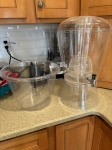oil tank remediation
Seriously? I am not certain that it would be foolish to put remediation off. I would put it off and become very busy pushing legislation to protect home owners. Who can afford the possibility of 600K dollars without insurance? People walk away from their homes for less.
I would fill the hole with raw cotton, and keep changing it out until legislation changed, or there was money in the superfund to pay for the remediation.
600k is the worst case high end scenario. Since it has happened it is the number that always shows up on these threads, pushing aside all of the posts where it cost 10k. That's still alot, but it isn't a lose the house type number.
LisaT, I think he meant paving the driveway over an unremediated situation would be foolish. Certainly, it would be very expensive to pave, then have to rip it up to deal with what's beneath later. And no one would buy a house that still had that going on under a driveway.
I just wanted to post that being able to read the past threads helped me through process of pulling our tank. So many of those here helped me understand the situation and vent. Thank you.
It was an active tank. Unfortunately, I was too busy one year out of 25 years to pay attention when my better half decided to "skip" the voluntary pull portion of the coverage. While we reinstated it, the lovely company that I paid oil tank insurance to for over 25 years insisted we wait another year to get coverage back in force for voluntary pull. Everyone kept trying to tell me it was rare to get leakage. Thankfully, I waited the full year to pull under coverage.
The tank was pulled, it leaked, everyone knew it right away. It got tested. More digging, more digging. Scary couple weeks. Thankfully all covered. Except of course having to put in another above ground tank, and the deductible. My better half took a time lapse of the whole thing posted on FB. It went as deep as you can, but ultimately, stopped short of crossing into really scary " groundwater" territory, or having to jack the house, or the dreaded encroaching on neighbors property. More than double what the company initially projected was needed to be removed. I found it shocking that it was "ok" by the oil tank protection company to let it continue to leak vs pulling voluntarily.
I agree with another poster, the oil delivery company had to have known. Even in this short period after pulling tank, the rate of use is so incredibly different. Another incredibly ridiculous thing is the oil company insisted on delivering a full tank late in season -after better half communicated in no uncertain terms do not deliver, we are pulling tank. So there is a lovely temporary outside storage tank because the inside tank is 1/2 the size of the outside tank. My neighbor adores it...NOT. (But has had no problem getting multiple over asking bids on his house!). I cannot express however what a relief it is to have this behind us, a weight of worry off our shoulders. Plus knowing you can sell your house. Having the documents confirming pass EPA. I am guessing our "usage" will be significantly less this season.
Kicking myself for being oblivious when this whole issue around in ground oil tanks first arose. I really feel for anyone facing a massive clean up. I concur from time I spent consulting with many people, it may be possible to go back to prior owners/insurance companies depending on what assessment the experts can piece together to determine if others need to share in the costs. Work with reputable people recommended in the prior threads and posts. This was one of the times my paper packrat mentality helped. I was able to literally go back to the start of purchase of house for all documentation when we were trying to see if legally we could force the situation for coverage vs wait a year, as well as establish the history based on what might happen when we pulled.
Also, no matter how great you think your insurance agent is - they do not do enough to alert you to a time bomb. My same agent that initially insured the house/property, spoke with me for years about all sorts of other stuff (that probably made money for him) did not elevate idea of pulling tank years ago, and did not track me down to speak with me in person before the insurance company pulled the oil tank / covering remediation including 3rd party coverage. Needless to say, all I dream about is moving to another agent/company. Its complicated extracting our unique insurance situation and finding a replacement, but we will get there one day soon.
Last bit of advice came from a neighbor that had recently pulled theirs ( a measly $12k job). Apparently while they do attempt to pack down the soil, shared he has had sinking of the lawn and been adding soil on top. So helped us avoid spending the money for the lawn girl to redo our lawn after the removal (fairly small lot, and essentially the entire front lawn/garden was removed). So now waiting to see if it sinks/let it settle and bring her in to re-establish a great lawn next spring.
To person posting it seems to be a NJ thing that this has taken on the level of cost and lack of coverage- it is. When I was doing my research, and seeking other insurance coverage, companies outside this area were convinced there was coverage options, including other oil tank protection companies. They did research for me - came back and literally confirmed there are no options, and they are shocked. And its been elevated to an incredible fear, cannot sell houses, escalation of costs. I often wonder if the creation of the original fund and those jumping in to profit from it did not set some of this in motion in New Jersey.
Ok, done with what is hopefully my final venting on the situation and crossing fingers closing the book on this household drama.
Why would anyone use the tank puller to manage soil testing? It's a total conflict of interest and should be illegal.
sarahzm said:
emmie said:
Could you please elaborate on "can't trust tank puller"? I need to be aware of this, since I have a tank that need to be pulled.
sarahzm said:
you cant always trust the tank puller.
on two occasions I have had tank companies pull a tank and tell a homeowner then and there that they need remediation - no need waste the time and expense to send in soil samples. They produce a tiny jar with soil in it that smells very mildly of oil and say 8 to 10K will clean it up. When the owner insisted on getting the soil tested it was well within allowable limits. I've been told it's known in the trade as "pull and bull" . If you have a tank pulled make sure you are there when they do it and insist on soil test and insist on getting a copy of the results.
Several years ago I also had a client who was told she needed remediation. The company dug out the "contamintated soil, sent in a sample and told her they needed to dig more. She called the testing company and got her test results and - oooops - the results had passed.
I wouldn't go that far. If you think your car needs new brakes, do you take it to a mechanic for diagnosis and to another for repair? Similar a broken elbow? Comes down to trustworthiness, reputation, and references.
Similar to an extent but not the same. Regardless, I would not let the excavator decide if the soil was contaminated.
Make sure the sample is pulled from your hole. Smell the soil yourself. Dig soil out while the hole is open if it smells bad. Refilling and digging again is a waste of money. It's not rocket science.
tourne is right.
by the way, I know someone who had a tank pulled, paid $11K after holes or rusty areas were seen in the tank, and was told that the soil samples were being sent in, and the No Action Required letter would be sent to her from the state. What is to stop the guy pulling the tank from sending in clean soil samples from elsewhere? I just don't understand how someone can say a NFA letter will be coming before the results of the soil testing arrives.
In the case I referenced, from the first bucket of the backhoe there was no doubt given the unmistakable odor. Upon pulling tank,all the holes were evident. The color/ shading/glistening of soil from about 6" down visually confirmed the problem. An EPA certified lab tech showed up and pulled his own samples.20,000 PPM. Regarding remediation, while trust has to had in the contractor, there will be a lab tech present to pull samples and site test them until clean margins are realized. The contamination goes to where it goes to. The damage is done. The only question remaining is how extensive. That can only be realized by starting the process of removing soil.No wiggle room.
Doesn't the town send its own inspector to examine the tank and the soil when the tank is pulled? That's what happened in our case.
Yup, town inspector visually inspects tank. In this case it failed. An EPA case # is given to the inspector by the contractor who had called it in to the EPA, thus ending the towns participation in the process. While the inspector may eyeball the soil or give it the sniff test, it is the condition of the tank that is his primary responsibility.
georgieboy said:
Yup, town inspector visually inspects tank. In this case it failed. An EPA case # is given to the inspector by the contractor who had called it in to the EPA, thus ending the towns participation in the process. While the inspector may eyeball the soil or give it the sniff test, it is the condition of the tank that is his primary responsibility.
Yes. Kind of dopey in that a lot of de commissioned, sand filled tanks may have had a hole punched in the bottom to drain water. What is in the hole is what really matters. And there is nothing to prevent the contractor from removing soil that smells of fuel before taking a sample. There is a lot of easy money in tank removals driven solely by the real estate market.
ProGuard, the insurer, requires an independent inspector to be on site, I believe.
Okay, thanks. I do believe the town inspector went to the relative's house, so I guess it is all on the up-and-up.
For Sale
-
REVO luggage $100
More info
Free Items
Employment Wanted
Latest Jobs
Employment Wanted
-
May 22, 2024 at 2:03am
-
May 21, 2024 at 8:20pm
-
May 21, 2024 at 8:17pm
-
May 21, 2024 at 2:29pm
-
American Council on Exercise (ACE) Certified Personal Trainer available!
May 21, 2024 at 9:34am
-
American Council on Exercise (ACE) Certified Personal Trainer available!
May 21, 2024 at 9:27am
-
May 20, 2024 at 12:28pm
Help Wanted
-
RF513 FT Live in or Live Out Nanny for Infant (June 10th Start)
May 21, 2024 at 3:52pm
-
SF5004 PT Afternoon Nanny for 2 (Late August Start)
May 21, 2024 at 11:18am
-
WF752 PT School Year Nanny for Infant (Late Aug Start)
May 20, 2024 at 9:35pm




















20,000 parts per million on the samples. Workable # is more like 5000 parts so the contamination is somewhat extensive. Have learned that there is no time limit for remediation,in fact, if he wanted to pave over the driveway he could,although that would be a foolish move. It still has to be dealt with, just not in a "time is of the essence" mindset. Most certainly before he could market the house though thats not on the table at the present time.